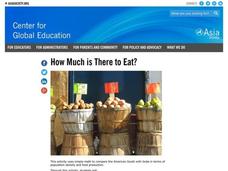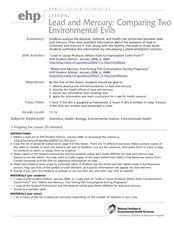Curated OER
A Yen for Maximum Residue Limits in Food
Future public health officials or agriculturists read an article and answer questions concerning the Japanese regulations for pesticide exposure. They compare the maximum residue limit for two, 4-D of Japan with other countries. This is...
Curated OER
Home Living / Daily Living: Labels on Food Products
Everybody needs to know how to make healthy choices when it comes to food. Understanding food labels is the first step. Using empty food packaging, you'll discuss what food labels are, what information can be found on them, and how to...
Curated OER
Lesson Plan: What We Value
How have values changed? How does our society influence our choices? Two great questions lead this discussion about food production, history, and cause-and-effect relationships. Pupils analyze a limestone relief from Assyria, research...
Curated OER
How Much is There to Eat?
Learners examine food production related to population density. In this interdisciplinary lesson, students gather data regarding food production in the American South and in India. Learners follow the outlined steps to calculate the...
Nemours KidsHealth
Food Labels: Grades 3-5
Bring awareness to the ingredients scholars ingest daily with two lessons that look deeply into food labels. The first lesson explores the difference between processed and fresh foods while the second lesson focuses on sugar content.
Curated OER
Compare and Contrast Cultures
Using informational text to make cross cultural comparisons is a great way to build a global understanding and comparative analysis skills. With several handy worksheets and a Venn diagram the class will read to make cross textual...
Curated OER
Sharin the culture of food production
Students compare food production and procurement in Alaska and the Russian Federation. They compare food production and procurement within Alaska. Pupils comprehend and appreciate the differences Alaskan students meet children from...
California Academy of Science
Sustainable Food Solutions: Weighing the Pros and Cons
A growing demand for sustainable food systems comes from schools and even some cities. So what are some solutions? Scholars consider four different ways to approach sustainable food solutions and list the pros and cons of each. The fifth...
Curated OER
Junk Food Jungle
Learners become familiar with the nutritional value of foods advertised on television and in magazines. They discuss different types of foods and where snack food fits into a healthy diet. They categorize the foods they eat as healthy or...
Really Good Stuff
English/Spanish Cognates: Food
Everyone loves food! Help your English language learners pick up some vocabulary with a series of activities based around cognates and food. Pupils practice each word and focus on the words in-depth by filling out Frayer model...
Curated OER
Wow! You're Eating Geography
Learners examine patterns of food producing areas, and identify foods that are grown locally, in the U.S., and around the world. They map and graph the major food crops of their local area, the U.S., and other countries, and discuss the...
Curated OER
Lead and Mercury: Comparing Two Environmental Evils
High schoolers in chemistry or health courses look at the material safety data sheet (MSDS) and periodic table of elements to gather information about mercury and lead, two toxic materials that have been found in food products. They read...
Curated OER
Food Pyramid
Young scholars construct food pyramids by painting shoe boxes and using them to respresent different food groups. They cut out and paste pictures of the respresentative foods for the groups on the box sides. They compare their diets to...
Curated OER
Fresh Foods from Farm to Table
Are you a good egg? Learners begin a farm-to-table activity by acting out verbs in groups to demonstrate the egg production process, and then research the steps using online resources. Several excellent videos are linked through the...
Curated OER
Great Lakes Food Web
Learners identify species and components of a Great Lakes food web. Using note cards, they place themselves in the correct order of the food chain based on the species present. They discuss what they believe happens to various species...
Curated OER
Student Handout 5B: Group Discussion
A fantastic discussion awaits your class! They read position statements from both Taco Bell and the Coalition of Immokalee Workers. They consider the statements fully. and then use three questions to engage in a class discussion on the...
Media Smarts
Packaging Tricks
As part of their study of how advertisers use various techniques to influence consumers, kids examine the design, the promotions, and the product placement in the packaging of their favorite foods.
Curated OER
Ecuadorian Rainforest
Have your class talk about the importance of the rainforest and the products that come from it. Learners watch a video showing the path of chocolate from the rainforest to the supermarket. They discuss how the rainforest and chocolate...
Curated OER
Uncover the Truth about Food Labels
Students understand the information on food labels. In this food label activity, students dissect food labels for health information. Students learn to calculate calories. Students complete an interactive quiz.
Council for Economic Education
Athens and Olive Oil
Athens had olive oil—and lots of it! However, it needed wheat from the Egyptians. Understanding how societies get what they need through advantage and trade can be complicated. A scripted role-play exercise and in-class production...
Curated OER
Peanut Butter Broccoli
Fifth graders explore food production by viewing DNA presentations. For this genetic engineering lesson, 5th graders discuss the foods they typically eat at home and how many common foods are engineered in a way that can produce a bigger...
Curated OER
Survival of Native American Culture
Students research the five tribes of the Iroquois Nation focusing on housing, food, clothing, transportation, religion, and language. They research using Internet sources and book mark sites for reuse.
Curated OER
Food Chains
Students study food chains by creating their own slide show using KidPix. They compare information after sharing their slide shows as a whole group. As the children are watching the slide shows of their peers, they tally every time...
Curated OER
Food Label Scavenger Hunt Lesson: Worksheet with Twenty-one Food Lab
Students investigate the nutritional value of foods. In this scavenger hunt lesson, students compare various foods using food labels to determine their calories, fat, saturated fat, sodium, sugar, and protein. There is a link to the...

























